We recently played a whole lot of Anthem, covering sections in the beginning, middle, and end of the game. There’s lots to dig into, and you can listen to our early impressions of how Anthem’s flight, mission structure, and multiplayer work on the latest episode of New Gameplay Today.
We also caught up with lead producer Mike Gamble to talk about some of the nuances of maintaining a live game, how BioWare is already listening to feedback and tweaking the game up until launch, and more.
Game Informer: From what we’ve played today, I have a better sense of the structure of the game, in terms of how the mission flow works. How much of that do you feel is in flux? How much of it do you see as evolving over the course of the game’s lifespan, in terms of adding new mission types, things like that?
Mike Gamble: We can do a couple of things, and we have plans to actually do many things. The first thing is, when you play the game in freeplay, or even when you play in some of the missions, a lot of how the combat is set up – the creatures as well as the types of gameplay activities that you have in combat – we can keep adding to that pool.
You have an Annex, where you have to hold a point down, as part of that pool. We can add new gameplay mechanics like capture the flag. And then we can add new enemies to the pool, which will dynamically update all of those existing encounters with those enemy types, more strategic objectives, things like that. So we’ll do all that.
In terms of the structure, you might have seen the launch bay, which is kind of like a social-style space. The idea is that when you get to the elder game and you just want to run quick missions with your friends, you would go back to the launch bay, ready up quick, do your loot resolution, and then go back out. You don’t necessarily have to go back to Fort Tarsis. When we add new content, we have the choice to make it stuff that’s accessible via the launch bay, or accessible via Tarsis, or both, and that’s a very different type of content.
If it’s story-based content, which affects the characters in Tarsis, we’ll ask you to go back to Tarsis. If it’s different types of content that doesn’t affect the characters in Tarsis, or introduces new characters, you might use the launch bay exclusively. We have some flex in how that works.
Part of how we use that stuff will be based on who’s playing and how they’re playing. If folks are playing primarily endgame with groups, then we’ll cater towards that and vice-versa, so if people want more story content we’ll add to that. I’d say the structure is set for what we want to launch, but it’s extensible and flexible for post-launch.
Is that content going to scale to different group sizes? Is the idea that you’ll be able to have a group of four do anything in the game?
For the launch game, yeah, definitely.
Do you have plans to add things with different player counts?
We look at everything. I’m being super generic for a reason: We’re not taking anything off the table. We’re balancing the game right now, and the other game stuff, and the main game stuff for four players. What happens after that, we don’t know.
In terms of adding content in the post-game, how much of that is going to be free versus paid?
We’re definitely letting players extend their time with the game by adding free stuff. Absolutely, definitely. In terms of adding things in the future, we haven’t really planned that, we don’t know. Honestly, it’s like, maybe a new Javelin will come out, or maybe an entirely new class that changes everything will come out, we don’t know yet. But the idea is story updates, changing the world in ways we have control over, so changing enemy types, adding new enemy types, things like that. We want all that to be kind of the free, ongoing live-service stuff. Adding more weapons, adding more gear, adding more cosmetics, with the hope that to support that, on the live-service stuff, people are buying cosmetics.
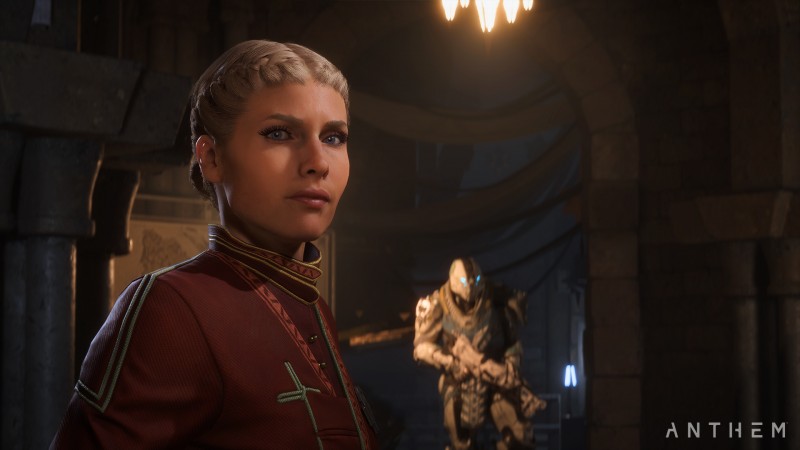
We got to see some of the interactions you can have with people in Fort Tarsis. How much do the choices you make in those conversations change your relationships with those characters?
Usually what will happen, and I don’t want to spoil the story aspect of it too much, we have a faction-reputation system in the game. Basically, you can earn reputation for the Arcanists, the Freelancers, or for the Sentinels. The choices that you make in these conversations favor some of those factions, and some give you points for other factions. So even if you’re talking to the Arcanists, if you’re talking to Mathias, and you tell him something that is anti-Arcanists, or negative to Arcanists, then it will up [your reputation with] the Freelancers.
You manage those reputation pools, and of course doing missions, and freeplay, and other things also add to those reputation pools. Then there’s the character-specific stuff, which is like, if I say this, does this character do this forever? And yes, there are examples of those littered throughout. Usually, you have to build the relationship to a certain point before you can start to make those decisions. You may have seen in the demo that you can get one or two characters almost to that point. Then it changes the outcome of that character.
Outcome as in of the plot, or do you get different rewards based on your loyalties to these factions?
Both. In terms of the factions, if you favor the Arcanists, you’ll have different blueprint unlocks. It says that in your challenge screen, it’ll be like “Arcanist Whatever 1, look at all the things you can unlock with that.” Then part of it is a little piece of Fort Tarsis will change once you do those things as well. So for example, I don’t remember if it’s the Arcanists or the Freelancers, but one of the factions, once you get to their level one or two challenge, then the fountain in Fort Tarsis clears up and it’s no longer full of sludgy goop and it’s like a flowing fountain. Examples of that are kind of littered throughout.
In terms of rewards for the player, are there faction-specific guns, or cosmetic sets?
There are not faction-specific guns, but there are crafting blueprints you can only unlock by doing those faction challenges. It’s not like the Arcanist pistol, but the it’s like a pistol that you only get it by doing that [challenge].
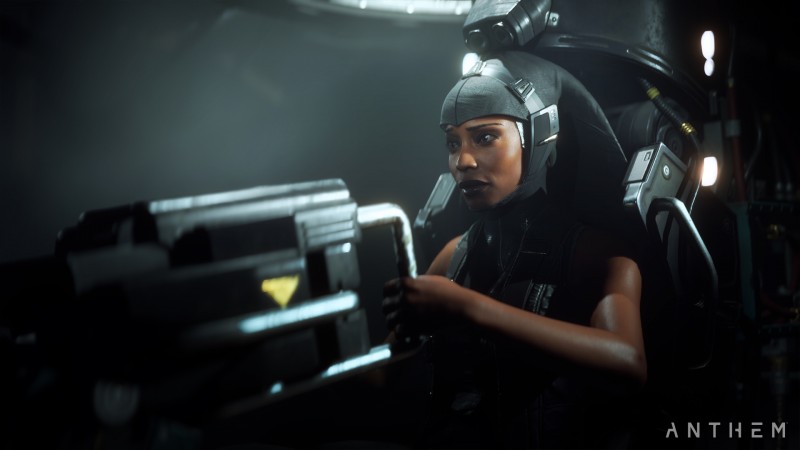
How much of that faction stuff is malleable? If I got to this level with this faction, but I want this blueprint from another faction, can I double back and try to make up with them?
The good thing about the factions is that conversations and choices are only one input into the system. So if you go out and there’s Arcanists who are in trouble, and you rescue those Arcanists in a world event, you’ll get Arcanist faction points, and since that kind of content is replayable. If you really wanted to, you can go after the specific things from the other factions. Ideally, after many, many, many hours, you could get all three factions to 100 percent if you do that.
Are there going to be any faction-specific missions?
Right now the faction-specific missions are the ones that Mathias, Brin, and Yarrow give you. Yarrow represents the Freelancers. He’ll give you a number of missions before the endgame, and also missions after the endgame, about that faction, Brin represents the Sentinels, same thing. Yarrow is the Arcanist group. You’ll have an number of Arcanist missions, you’ve probably played a few of them. Once you hit the end of the critical path, then some more of them open up for you to play. And then there’s contracts.
So those are missions that I might be able to unlock that other people wouldn’t? Is that the case?
You will unlock them once you – that one isn’t tied to your faction level, those are tied to completing the previous mission.
So there wouldn’t be any mission where one person unlocks it and the other person hasn’t unlocked it?
Correct. We don’t really want to have that. For example, if you’re on Mathias’ third mission, and I’m not, I can still join your mission if you invite me. We should probably be clear about the fact that I haven’t unlocked that one yet, and that’s a tweak that we’re going to make in the game. But I should still be able to play it with you. But then, later on, I haven’t unlocked it, so I’m going to have to unlock it.
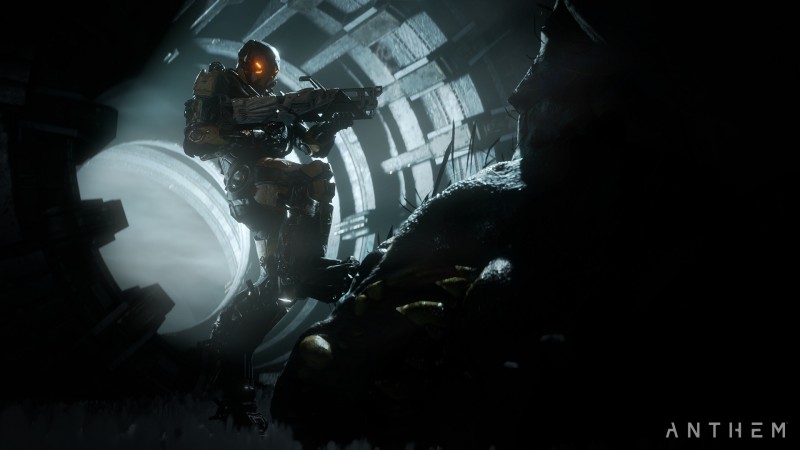
Is any of the stuff going to be retroactive? Would you have to do that mission again later?
Yes. So what’ll happen is, when we’re in a squad or I’m reinforcing you, I’m kind of helping you as part of quickplay, I’m helping you out. I get the benefits by getting XP rewards, basically being able to further my job and loot. But it’s not done for me in the story. Because then that would cause some interesting issues where if you’re on Mathias V and I’m only my Mathias I, and then if I help you and finish Mathias V, then what happens to one through four? So we don’t want to do that to players. We want to give them the best of both worlds. You can still play missions that you haven’t unlocked yet, because other games might not let you do that. But at the same time, we don’t want to auto-complete it for you.
For the quickplay, are there going to be some mission types that aren’t going to have matchmaking?
No. They’ll all have matchmaking. The only ones that don’t have matchmaking are the introductory missions. Because the narrative of the introduction is that you’re a single freelancer in this scenario, and we’re going to matchmake people.
Then of course, the game is a dedicated-server model, so when you’re in Fort Tarsis you’re not in a dedicated server, you’re on your own. But then when you go out into the world you’re in a dedicated server. You can set that server to be private, so just you on a dedicated server, and you can play the game as you want solo, then go back to Tarsis.
But we hope that players eventually realize that playing with friends is really beneficial.
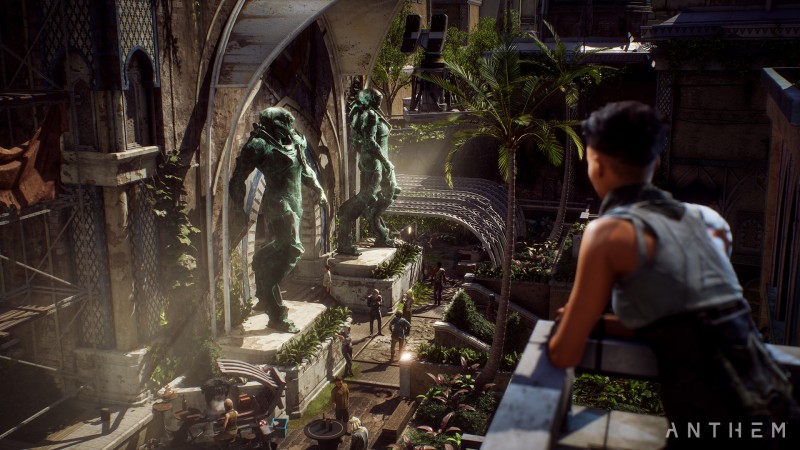
One of the most requested features for games like this is crossplay. Where do you all sit on that?
We’re in the “pro” column. We want to do it. It’s just not going to be there for launch. We’re going to look into it a lot more, we’ve already been looking into it quite a bit. We’ll have more news on that later. But in terms of how does the Anthem development team feel about it? We want you to play with friends, that’s the thing about Anthem. If your friend happens to own an Xbox, and you happen to own a PlayStation, we still want you to play with your friends, so that’s what we’re going for.
Do you see PC being able to interact with that at all?
Oh yeah, yeah. PC interacting with consoles, same thing.
Would there also be potential for cross-save, carrying your characters around consoles and PC?
That is actually easier than crossplay. The way it all works is that there is a local save file, but that’s not really not where everything is stored. Everything stored is on your account. Allowing you to access that stuff on another platform is actually easier to solve. But still, not for launch.
Diving back into the story stuff. Let’s say I have a group of four who want to see the whole game through. People do things at different paces. How do you see that blending in with the mission structure?
You have to play at your own pace. If you’re grouped up with a bunch of your friends who are yelling at you, well then you know that you’re not going to be able to read all the Cortex entries in Fort Tarsis. But you then know that you can log into the game, or after your friends are done or whatever, and then you can do all that stuff solo; you can do that at your own pace.
Likewise, if you’re playing with your friends, and you want to talk to some people, make some decisions, you can say, “See you guys, you guys run this mission, we’re going to be in chat while you’re messing around in Tarsis.” That’s fine too. And then afterwards if you want to join a group of randos, or invite some randos into your game. It’s supposed to be asynchronous, so that you can play at your own pace, rather than being forced into a certain structure. If you choose to play with all four people at once through the critical path, this totally supports that. But if you choose to break away from that, it also supports that as well.
Ultimately, it kind of comes down to this: Everyone plays these games differently, and we have to try to support as many of those play styles as possible. A lot of the traditional BioWare fans who usually play games single-player, they don’t get into the whole “I group up every night at 8 p.m. with my crew and we go do this stuff,” so we had to give an opportunity for them to play as well. Likewise, if you play with peeps, then the game supports that because even if one guy couldn’t make it one night and you guys move forward and play the next critical-path mission, he or she could easily join up with you to play the next one.
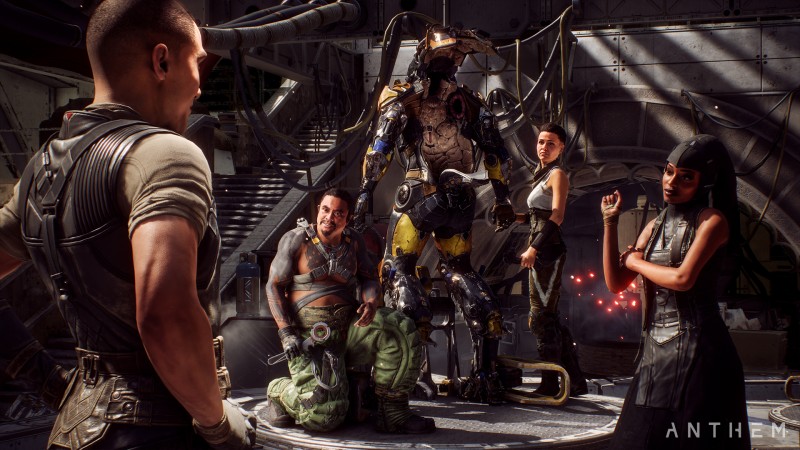
How scalable is that going to be? Let’s say I have more hours per week to dedicate to Anthem in the long run in the endgame versus some of my friends, and there’s a new stronghold that requires a high power level. How scalable is that? Are they going to be able to jump in with me?
Yes. That’s the whole reason why we did this. This is an example at its extreme, just so you’re aware. You’ve been playing Anthem forever, and you’ve unlocked Grandmaster Three, the hardest difficulty that we have, I can’t even beat Grandmaster Three right now. So you’re playing with two other people, and then your new friend has bought the game for the first time and gotten past to tutorials and is into Lost Arcanist. You can invite that person into your Grandmaster Three stronghold, because damage and loot and everything is relative, and it’s instanced to the player. You’ll have a really hard experience and people will shoot you in the face and you’ll die quick, but you’ll also get legendary loot. Your friend will get common and uncommon loot. When they kill enemies, it will be a relative difficulty to them. So everyone is still leveling up relative to their power level, but there’s no, “Oh no, you guys can’t join us because you aren’t cool enough.”
How are you approaching balance in Anthem? There’s no PvP, but how amenable are you to feedback from the community, of like “oh, this particular gun is too strong.” Are you seeing problems like that?
Yeah. Already. We’re super-amenable. Obviously, if anyone knows anything about this kind of game, one person’s buff is another person’s nerf, usually. It’s just kind of how it is. But we’re paying attention as much as possible. I don’t know if you’ve seen, but we’re doing livestreams, we’re active on Reddit, we’re trying to foster that relationship even before we get out so that people know who we are, people know who to come to, they know who to yell at, they know who to praise, we want all of that going into launch.
There’s going to be things that will happen, that we need to fix. No one gets it right 100 percent of the time. We want to do that, and we can tweak all that in the backend. This includes the economy, so that’s one big thing where it’s like, “All right, when players play the demo on the weekends, you absolutely positively have to know that the economy is different in than the game.” Because it’s a shorter amount of time, we wanted to make things easier to get, so you can get them. Likewise, when the game comes out, we want to make sure things are fair to earn. And we’re monitoring player feedback on all that, too.
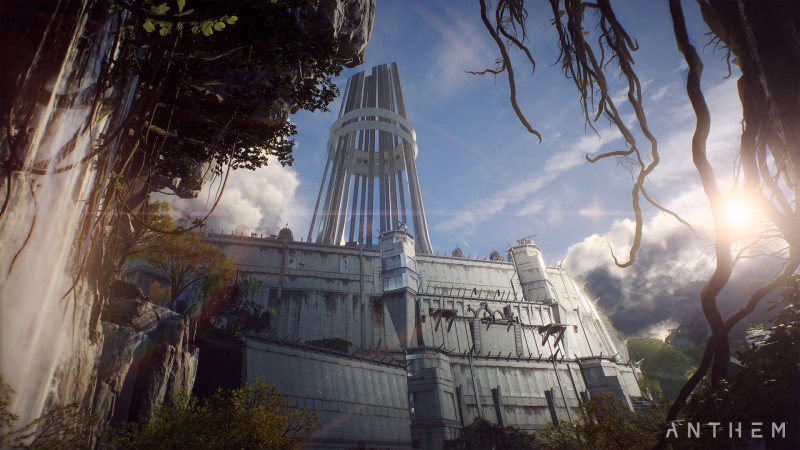
What’s been the thing that’s changed most in development based on community feedback?
A bunch of different stuff. Anything from UI changes, the infamous “damage floaties” thing, that was a big one, being able to turn to damage numbers that pop up off, tweak them. Questions about how to access certain things, how to give specific loot rewards for doing specific things.
Also being able to play in a social way so we added the launch bay, which we never had before. Before we had this concept of going back to your Strider and then mulling around with your crew for a bit, then going back out. That didn’t really serve the vision for the game at all, which Tarsis really serves that well. So we said, “Hey, let’s put the Strider away, and put a social hub in instead.” So it’s constant listening and changing like that, which we’ve done all the way until launch. We’re going to be doing from now until launch, and obviously post launch. There’s a team dedicated to doing it.
With a lot of games like this, it always feels like the first year is the roughest in terms of variety of things to do. Then a year from now, people say “Destiny is good now,” or “The Division has more content.” Where do you feel Anthem is going to sit on that spectrum? Do you think Anthem will be a very different game a year after launch? Or do you feel you’re where you need to be?
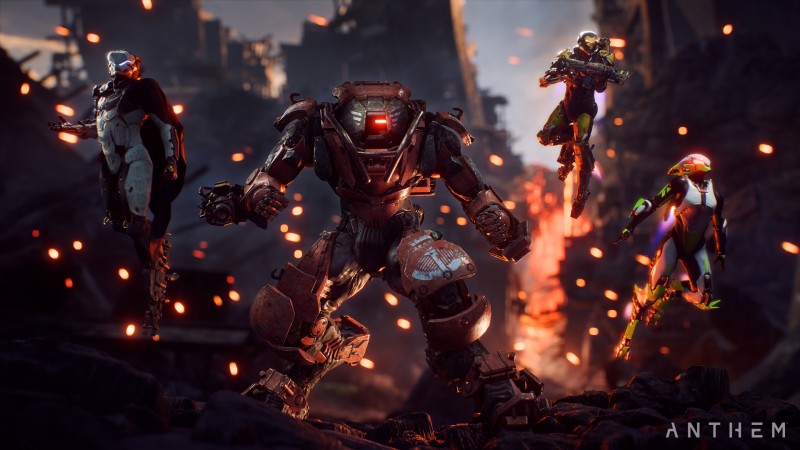
I feel like we have what we need at launch. It’s a good framework, and the narrative conceit is there, the storytelling base to continue to build on, the type of content that we want to release post launch, we already know fits in well with everything. The systems are extendable, like we talked about at the beginning. Everything is there to build and continue building on. Make no mistake, as I said earlier as well, there are going to be things that have to change, there are going to be things that the community wants that we haven’t built into the game and we’re going to pivot. Casey [Hudson] actually released a blog today that said as much, which is like, “We’ve done everything we can, and now the last missing component is all the people who are going to play the game and give feedback.”
Then it is what it is. It’s no longer in our hands, it’s now the people who are playing the game, buying stuff, enjoying the game. They get to help us figure out where we’re going.
What kind of feedback are you most interested in right now?
I’m interested in seeing if people are enjoying the characters they’re meeting in Tarsis. They’re unique little stories, and how they play out over time. That’s just my personal bias, because I’m the Mass Effect guy or whatever. I like that. I think what’s important to the long-term health of the game is economy feedback, that’s a huge thing. Does it feel like you’re actively pursuing a great reward every time you go out? Do you want to do it again and again? That’s the kind of thing that we care about a lot. That’s why there’s been a couple of closed alphas and the demo is coming out. We’re listening to all that stuff.
